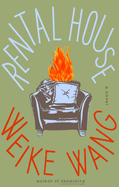
A New York couple in their late 30s navigate seismic cultural and socio-economic differences in Weike Wang's intimate drama, Rental House. A PEN/Hemingway Award-winner, Wang thematically centers her third novel on a post-pandemic family vacation, as parents and adult offspring cautiously reunite.
Nate and Keru live in Manhattan with their sheepdog, Mantou. He's a scientist in academia and she's in consulting, earning far more than her husband. Keru is a Chinese American raised with a strict, unforgiving work ethic, a product of her parents' immigrant dreams and sacrifices. Nate, meanwhile, escaped his rural, conservative "white trash" upbringing "at the foothills of the Blue Ridge Mountains" to attend college on financial aid.
The novel opens as the couple's parents descend on their Cape Cod vacation rental for staggered visits. In the following part five years later, Wang's protagonists are on vacation in the Catskills. With skillful precision, Wang (Chemistry) observes them through the lens of their vacationing neighbors, offering tantalizing glimpses into who Keru and Nate might have been had they not married one another. Against these scenic backdrops of a holiday rental in Cape Cod and later in the Catskills, she masterfully probes the inner workings of a contemporary marriage, exposing cracks that linger long after its foundation settled. The Catskills trip ends eventfully with an unexpected visitor and a confrontation that marks a new direction in the couple's insulated lives. Keru wants more familial connection, even if it means she must carry the burden of Nate's deeply flawed brother Ethan. As Wang succinctly points out, "Marriage is fifty-fifty, but who said that? Who believes this to be true?" --Shahina Piyarali

